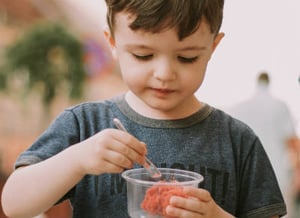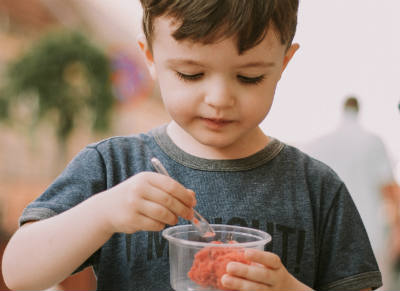Because preschoolers’ immune systems are still in development, they are more prone to food poisoning, and it’s also more difficult for young children to recover from food-borne illnesses. Preschoolers are more likely to choke, as well, especially on certain foods. So it’s important that food safety guidelines are carefully followed for their protection. Here is what you should know about food safety for preschoolers.
You can find multiple tips at ChooseMyPlate.gov to help keep children safe. One of the most important? Having them frequently wash their hands. Your preschooler should wash his or her hands with warm water and soap for 20 seconds after using the restroom; before and after eating; after playing with pets; or coughing or sneezing–or any time hands get dirty. To help your child understand what 20 seconds means, have him or her sing a verse of the Alphabet Song while washing hands. Keep a stool by the sink so young children can independently wash their hands, brush teeth and the like.
Certain raw ingredients are more likely to cause foodborne illness, so avoid serving them to your preschooler. These include any foods with raw or partially cooked eggs; any with raw milk; raw or undercooked meat; fish or poultry; unwashed fruits and vegetables; or unpasteurized juices. You can find food safety guidelines about safe minimum cooking temperatures here for meat, fish, egg dishes and more.
If you also have a baby in the house, don’t allow him or her to ingest honey. As EatRight.org shares, this sweet substance can contain toxic bacterium spores that can lead to severe food poisoning (botulism). Also, avoid feeding your baby directly from a baby food jar. This system of “double dipping” the spoon means any bacteria in your baby’s mouth is then introduced to the spoon–then the jar. If you store any leftovers, bacteria can grow and lead to food poisoning.
Instead, pour any baby food into a dish and feed your baby from there. Throw leftovers away. If you have baby food left over in a jar that has not been in contact with saliva from your baby, you can save strained meats for a day; vegetable and meat combos for two days; and strained fruits for up to three days.
Articles linked in this post contain several more tips related to food safety for preschoolers, and so does another article from ChooseMyPlate.org, titled 10 Tips: Food Safety Tips for Preschoolers.
Tips include several to prevent choking. Have your preschooler sit down while eating, rather than walking or running around while having food in his or her mouth. Don’t let your child lie down while eating, either. Some foods, the article warns, present bigger choking hazards because they’re harder to swallow. These include “peanuts, popcorn, round slices of hot dog, hard candy, whole grapes and cherry tomatoes.” Check the EatRight.org article for an even more detailed list. With those foods, cut them into small pieces for your child, about ½ inch in size.
Pay attention to temperature. If you’re sending your child to preschool with a lunch containing foods that should be kept cold, you can add a small ice pack or frozen juice box to an insulated lunch box. Or, if you use paper lunch bags, double up on them. To keep hot food hot, use an insulated thermos. If you plan to send soup, for example, put boiling water into the thermos. Keep it in for a few minutes and then empty it out. Now put in hot soup. To prevent the spread of germs when providing snacks, divide them into small bags. If you’re offering fruits or vegetables, rinse them before slicing.
Overall, follow these tips to help ensure food safety for preschoolers:
- Supervise eating
- Encourage chewing well before swallowing
- Read warning labels and avoid those with high choking risks
- Know how to perform first aid
Photo by Anton Darius | @theSollers on Unsplash.




